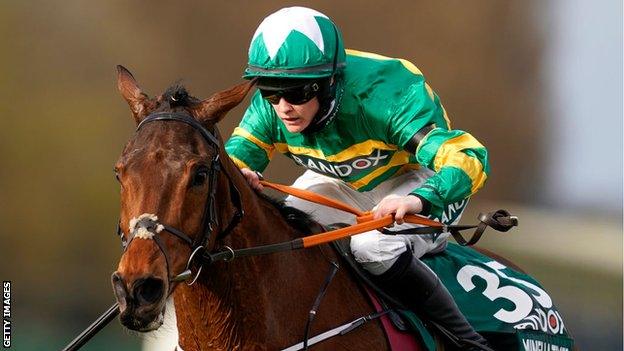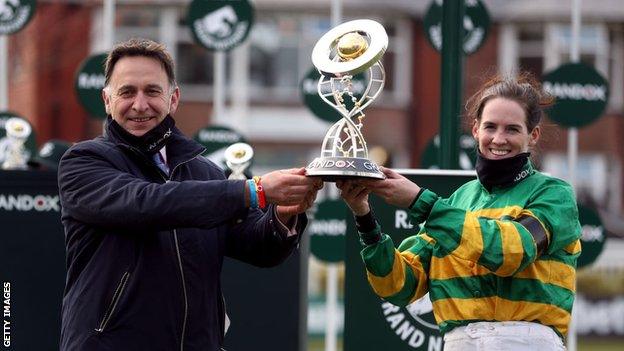Rachael Blackmore: Historic Grand National triumph for modest trailblazer
- Published

Blackmore was the first woman to be leading jockey at last month's Cheltenham Festival
Like countless young pony riders, Rachael Blackmore watched the film National Velvet starring Elizabeth Taylor and dreamed of one day winning the Grand National.
On 10 April 2021 she made fantasy a reality. The first female jockey to triumph in the world's most famous steeplechase, with a stirring victory on Minella Times.
"National Velvet was definitely something that would have been on the television when we were growing up. I've got no punchy line to go with it," she told me.
The iconic 1944 film saw Taylor play 12-year-old Velvet Brown who won the National on a gelding called The Pie but was later disqualified on a technicality.
Blackmore, a quietly spoken and articulate individual, had saved her 'punchy line' for shortly after passing the finishing line on 11-1 chance Minella Times, trained by Henry de Bromhead for owner JP McManus.
"I don't feel male or female right now. I don't even feel human," the 31-year-old Irish rider told ITV. "This is just unbelievable."
A little later she paused during an interview as the magnitude of her achievement sank in, took a breath and composed herself before continuing. Wonder woman is human after all.
Rachael Blackmore says winning Grand National is 'beyond belief'
'Beyond belief' - Blackmore's rise
The daughter of a dairy farmer and a school teacher, she rode ponies as a child near her home in Killenaule, County Tipperary.
Blackmore had once hoped to become a vet, gaining a degree in equine science and combining her studies with riding out and competing as an amateur before turning professional in 2015.
She has gone on to be a quiet pioneer - finishing in the top three in the Irish jockeys' championship for the past two seasons and is in with a chance of winning the title this time.
"My first memory of racing was when I was about seven or eight watching the Grand National round a friend's house and it had that special kind of hype," she said.
"I took out my amateur jockey's licence and didn't even dare to dream I would get a ride in the race, let alone ride the winner of it.
"It's such a special race. I finished 10th last year and got a kick out of that. To finish with your head in front is beyond belief, to be honest."
Her world is racing. Boyfriend Brian Hayes and housemate Patrick Mullins are both successful jockeys.
Teaming up with De Bromhead, who is based in Knockeen, County Waterford, has provided plenty of big rides including Honeysuckle, the landmark Champion Hurdle winner which the trainer followed up with Champion Chase and Gold Cup victories.
Blackmore has the talent - riding instinct, tactical awareness, strength in a finish - but also the work ethic. She is a grafter, competing in more races (516 and counting) than anyone else in Ireland this season.
And she has a high pain threshold, a big plus in a sport where ambulances follow every race and falls at 30mph are a way of life.

The partnership between De Bromhead and Blackmore has been hugely successful
'I won't be the last' - the modest trailblazer
It might be too much to say Blackmore has ridden to racing's rescue, but her feelgood story comes after a troubled start to the year where a trainer and jockey were banned after social media posts emerged of them posing with dead horses.
The success of women, competing on a level playing field against men, is a hugely positive narrative for the sport.
Flat jockey Hollie Doyle was third in the BBC Sports Personality of the Year award in December, while Bryony Frost was the first woman to ride the winner of the King George VI Chase at Kempton when victorious aboard Frodon.
"This means everything, it really does, it's hard to even comprehend it right now," said Blackmore.
"It's just an incredible feeling but you don't really let yourself believe it until you do actually cross the line."
Women were not permitted to ride in the National into the 1970s before Charlotte Brew was the first on a 200-1 outsider 44 years ago.
Eighteen other women have ridden in the race on a total of 35 runners but only in recent years have their chances increased - 11 of the first 15 National rides for female jockeys were priced 100-1 or more.
The previous best came when Seabass finished third in 2012 for Katie Walsh, who paid tribute to Blackmore.
"I'm delighted for Rachael," said Walsh. "This isn't just pot luck or a fluke, she's worked hard to get this.
"She's an inspiration to male and female jockeys. This is the most watched race in the world and it's just brilliant for horse racing."
Most within racing have little time for the phrase 'female jockeys' on the basis they are all just jockeys, although Blackmore recognised she would always be the first to have won the National.
"Ah, look, it's brilliant, but I won't be the last. I'm delighted for myself anyway," she said.
"I just hope it shows it doesn't matter, male or female. Plenty of people have gone before me and done that - Katie Walsh was third here on Seabass. All those things help girls coming along, but I don't think it's a major talking point any more."
Allow X content?
This article contains content provided by X. We ask for your permission before anything is loaded, as they may be using cookies and other technologies. You may want to read X’s cookie policy, external and privacy policy, external before accepting. To view this content choose ‘accept and continue’.
Allow X content?
This article contains content provided by X. We ask for your permission before anything is loaded, as they may be using cookies and other technologies. You may want to read X’s cookie policy, external and privacy policy, external before accepting. To view this content choose ‘accept and continue’.
Allow X content?
This article contains content provided by X. We ask for your permission before anything is loaded, as they may be using cookies and other technologies. You may want to read X’s cookie policy, external and privacy policy, external before accepting. To view this content choose ‘accept and continue’.
Allow X content?
This article contains content provided by X. We ask for your permission before anything is loaded, as they may be using cookies and other technologies. You may want to read X’s cookie policy, external and privacy policy, external before accepting. To view this content choose ‘accept and continue’.
It has been a surreal and privileged position to be among the limited media allowed to attend the Cheltenham and Aintree meetings, where spectators have been absent because of Covid-19 protocols.
With no throngs of exuberant punters, this allowed me to go to the finishing line and personally say "well done" to Blackmore as the meeting's leading jockey returned on all six of her winners at the Cheltenham Festival.
"Thank you, thank you," she would reply on horseback with a smile.
When I reminded her of this on Saturday evening, she said: "I'll never tire of saying 'thank you' after winning."
Blackmore may have smashed the glass ceiling as she went clear of her rivals, but is unlikely to get ahead of herself.